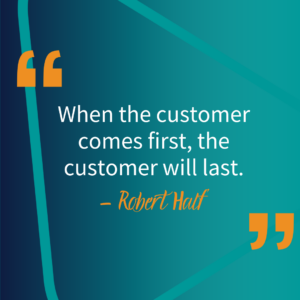Most small business owners are not marketers, and THAT’S OKAY!
Marketing is dynamic and almost alchemical, making it challenging for small business owners to know what to focus on and how to maximize resources. As we step into 2024, the challenges and opportunities have evolved, and entrepreneurs must navigate the small business marketing terrain wisely.
Like the old game of Minesweeper, pitfalls are everywhere, but you can avoid them if you know how to play.

Think of this article as your guide to avoiding some of the most common small business marketing explosives.
Mistake 1: Not Investing Enough in Branding
“But I have a logo, and I love it!”
Great! A logo that makes you happy is an excellent first step, but 2024 demands more.
Your brand should transcend visual representation. Think of brand personality, tone of voice, tagline, imagery guidelines, and customer relationship policies, and align them with your company mission, vision, and values.
With 33.2 million small businesses in the US in 2024 (SBA), vague and indistinct brands become faceless entities in a crowded marketplace. Customers will struggle to pick you out of a crowd or to build a connection with your brand.
On the other hand, thoughtful and thorough branding provides:
- Crystal clarity: A defined brand identity provides a roadmap for every aspect of your business, from product development to sales and customer service. It ensures consistency and clarity in all your communications. From the first moment a prospect engages with your brand, they will know what to expect if they become a customer.
- Competitive edge: Your brand becomes your differentiator, setting you apart from the competition and resonating with a specific audience. This attracts loyal customers and builds a strong market position.
- Emotional connection: Branding allows you to tap into your customers’ emotions, building trust, loyalty, and advocacy. This begets repeat business, positive word-of-mouth, and a thriving community around your brand.
- Strategic direction: A strong brand can guide your decision-making process, ensuring every action aligns with your core values and resonates with your target audience.
If this seems time-consuming or expensive, remember that branding is dynamic and meant to evolve with your growing business. If you’re just starting, aim for completeness rather than perfection in your branding journey.
Mistake 2: Winging It
Making things up as you go might work in some areas, but in marketing, it can result in wasted time.
Instead, we encourage you to follow the simplest approach to defining a small business marketing plan.
- Research – a LOT: Deeply understanding your industry, competitors, and target audience is crucial for crafting a successful marketing strategy.
- Outline a Strategy: Define your goals, target audience, and key messages to create guidelines for your small business marketing efforts.
- Make an Implementation Plan: Set a budget, timeline, and specific actions to execute your strategy, ensuring consistent and measurable progress. Make sure to define who is responsible for executing your plan.
Above all, emphasize research.
This knowledge becomes a powerful tool in all aspects of growing your business. Thanks to the internet and the rise of social media, consumer behavior has drastically changed – calling for the evolution of marketing and advertising. Understanding these changes will be the key to staying relevant and agile in 2024.
Marketing tactics that were popular and effective in 2005, or even 2015, are now outdated. Even if you still pursue traditional marketing tactics like mailers or radio ads, make sure there are some digital marketing channels included in your strategy as well.
A strategy will not only help you tap into the most relevant marketing avenues and keep your messaging consistent, but it can also help you avoid “shiny things,” or distractions, that take time and resources away from meeting your goals. If you see something new and exciting, refer back to your strategy and make sure it aligns before you decide to allocate resources toward that “shiny thing.”
Finally, an implementation plan helps hold you or your team accountable and will allow you to optimize and scale your small business marketing strategy over time. Monitoring data will be key in helping you determine when and if to hire an internal marketing manager or outsourced marketing partner.
Mistake 3: Ignoring Your Audience
If the only definition of your audience looks something like “men and women between ages 20 and 50 living in the United States,” it’s time to dig a lot deeper.
Depending on what you sell, you should know their family situation, their life goals, their fears, their personality, their hobbies and habits, their priorities, their communication style, and more.
This will help you make sure that you’re in the right place and delivering the right messages that answer their questions, address their concerns, and speak to their aspirations. Detailed buyer personas allow you to make your audience feel understood and improve the quality of any leads that come from marketing.
If you’re struggling to get more specific, consider splitting your persona into a few groups. Maybe your whole audience is indeed men and women between ages 20-50 living in the United States, but there can be segments within.
Perhaps one segment is married women between the ages of 32-40, living in the Midwest. Another segment could be single men between the ages of 23-35, living in a major metropolitan area. The habits, personalities, and interests of those two segments would likely be quite different, so the content you create for them should be unique as well.
You should also regularly engage with your audience online. Respond to comments, share their posts, and participate in online conversations. Feedback and engagement are goldmines for refining your small business marketing strategy.
And the real key to ensuring your business is sustainable is listening to your customers. Ask for feedback, take reviews seriously, reply with care and authenticity, and incorporate that feedback into your business.

Mistake 4: Over Promoting Yourself
Over-promotion is a common pitfall, and you can stand out from the crowd by doing the opposite.
Standing out doesn’t mean bombarding your audience. An overly promotional approach feels desperate and intrusive, pushing customers away rather than drawing them in.
By focusing only on what makes your business, service, or product so incredible, you’re failing to provide your audience with value. Instead, shift your language to focus more on their challenges and goals. Be subtle when suggesting that your business is the bridge between where they are and where they want to be.
Lastly, over-promotion all but eliminates any sense of community. “Authentic” was Merriam-Webster’s word of the year for 2023, and it’s for this very reason! Gone are the days of slimy sales tactics and cold transactions. Instead, consumers today value connection, authenticity, warmth, and relationships.
Authentic engagement and fostering connections are crucial for long-term success, and the most successful brands already understand this. Starbucks, Apple, Porsche, and Lululemon are selling experiences and emotions first and selling products second.
Mistake 5: Not Giving Consistent Effort
Inconsistency can cripple a small business’s efforts. Here’s why:
- Loss of Momentum– Sporadic marketing efforts can spark some initial interest, but they will quickly fizzle out due to a lack of follow-up. Inconsistent presence makes it easier for your brand to fade from memory, while customers move on to brands that stay top-of-mind through consistent communication. Often, you will have to start from zero with each new campaign, rather than using consistent marketing efforts to fuel momentum.
- Missed Opportunities– Inconsistent outreach makes it difficult to build a loyal audience. People lose interest without regular engagement and opportunities to connect. Occasional campaigns may generate short-term results, but they often lack long-term impact which can result in squandered resources. Lack of regular engagement also hinders your ability to track audience preferences and market trends. You miss out on valuable insights for optimizing your small business marketing efforts.
Marketing isn’t a one-time blast. Even if it’s really spread out, you need a schedule. Whether it’s three times per week or once per month- pick a cadence and stick to it.
Consistency offers priceless benefits to small businesses looking for traction– nurtured leads, optimization for better results over time, and a strong brand identity to name a few.
If you have fewer than 10 employees and no dedicated marketers, detailed planning can save time. It’s difficult to be consistent when your employees have other important responsibilities, but monthly batch content creation will maintain consistency without disrupting other operations. Take one day per month to plan and create any and all content that you want to publish in the next month. You can also take advantage of scheduling tools like Later or Sprout Social to automate social media publishing.
If you still struggle with consistency, it may be worth looking into an affordable marketing agency to help shoulder the burden of strategy building and everyday execution.

Despite there being more than twice as many small businesses today as in 2000, you can still avoid common small business marketing explosives and pave the way for building a resilient brand in 2024.
Partnering with an affordable marketing agency can alleviate much of the stress of your small business marketing. Verity Marketing Agency can help you create a detailed branding strategy, detailed customer profiles, and a strong marketing plan.
If you’re looking for the perfect outsourced marketing partner for small businesses, let’s talk!


